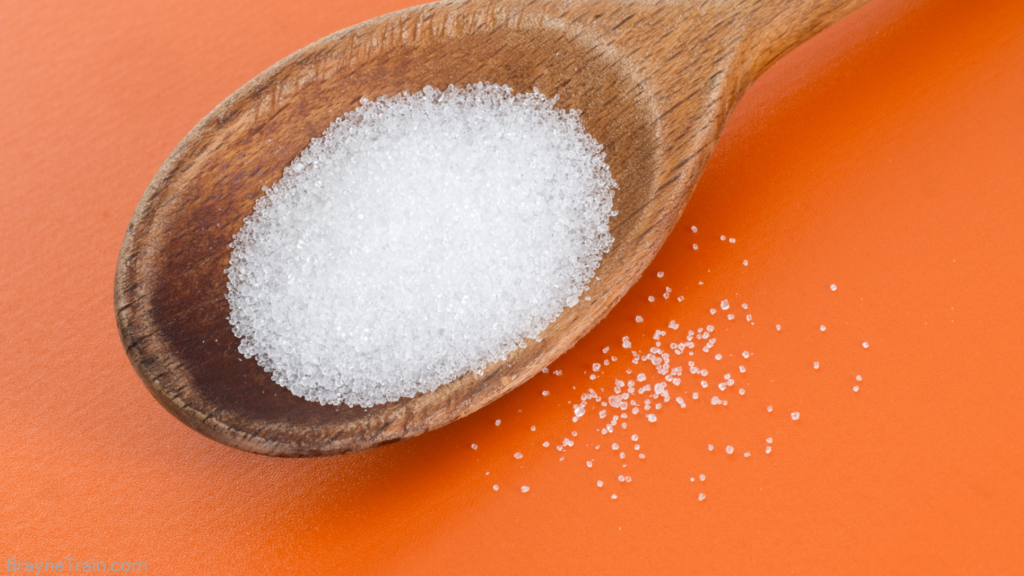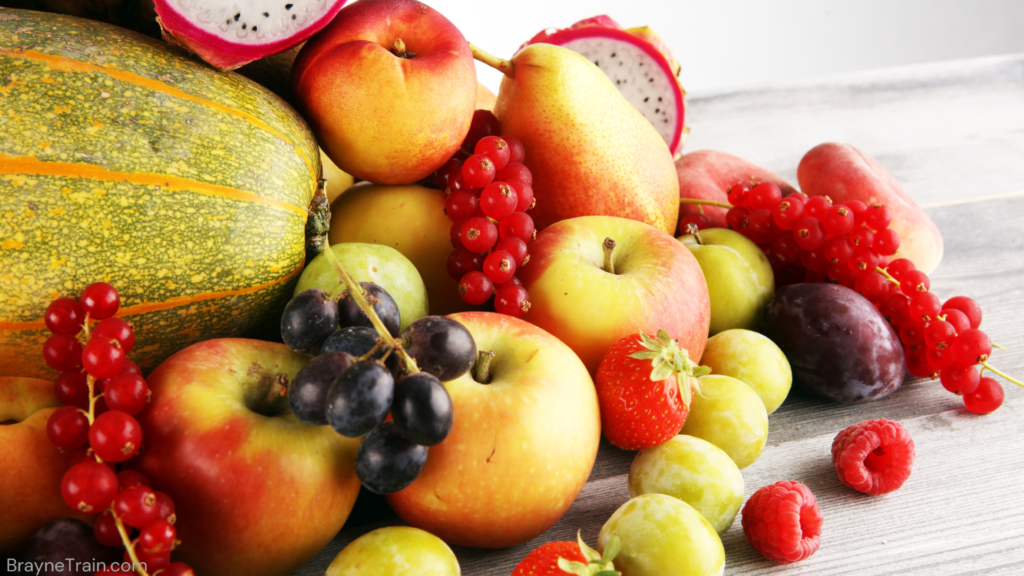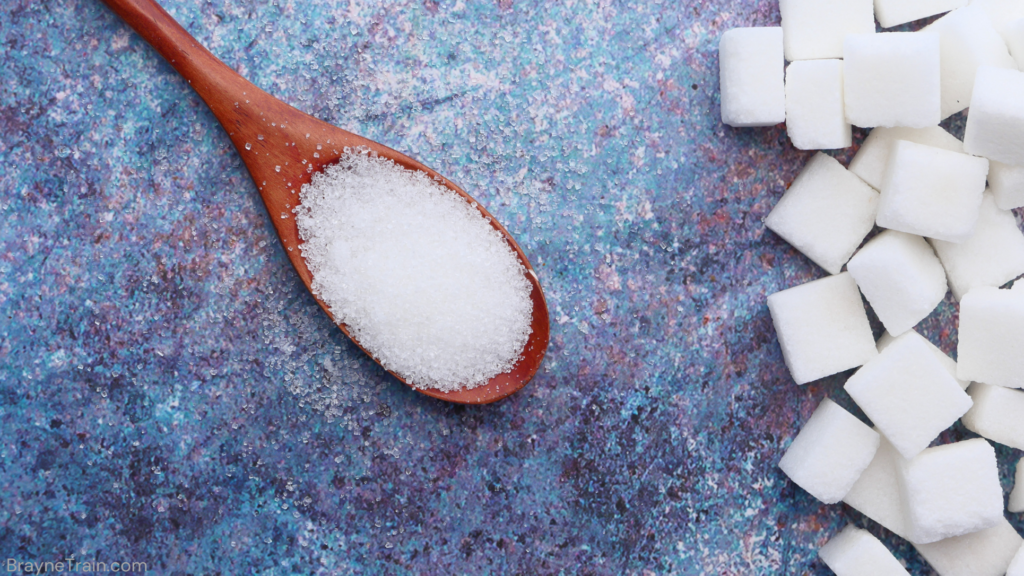
Does Eating Too Much Fructose Cause Belly Fat?
Fruit sugar or fructose is a ketonic simple sugar found in many plants and is the sweetest naturally occurring carbohydrate.
Fructose makes up ½ of table sugar, known as sucrose, and the other half is made up of glucose.
It is widely believed that fructose is much worst than glucose and contributes to many health problems including obesity.
Scientific studies indicate that eating fructose in excess increases visceral fat accumulation significantly. Visceral fat is belly fat found deep within the abdominal cavity. Visceral fat wraps around important organs like the stomach, liver, and intestines.

Why Eating Too Much Fructose Causes Belly Fat?
The human body is designed to consume fructose in moderate amounts when it’s in season.
The body is not designed to consume fructose in excess, and the liver can not handle excess fructose, so it stores it as belly fat.
While glucose can be used as energy by every cell in the body, fructose can only be metabolized in the liver.
In fact, 100% of fructose is metabolized by the liver and converted into fat.

Fructose gets converted into fat significantly easier than glucose and it reprograms your body fat to be stored mainly as visceral rather than subcutaneous fat.
Visceral fat has numerous cortisol receptors, therefore, eating fructose in excess increases cortisol levels.
Increased cortisol levels speed up fat accumulation, specifically around the belly region.
To learn more about how you can lower your cortisol, click here!
A study published in The Journal of Clinical Investigation looked at participants who consumed either pure glucose or pure fructose drinks for ten weeks.
The glucose group had no change in their visceral fat accumulation. However, the group that consumed fructose drinks significantly increased their visceral fat (belly fat).
How Much Fructose Is Too Much?
40-50 grams of fructose is the recommended upper limit for daily fructose consumption.
25-40 grams of fructose is the ideal recommended daily intake if you don’t want to worry about gaining belly fat.
If you follow a ketogenic diet, nutrition and keto experts recommend 15 grams of fructose daily.

Top 3 Worst Side Effects Of Fructose:
In today’s world, the average person consumes over 72 grams of fructose daily.
Compare that to what our ancestors consumed, roughly 15 grams of fructose per day.
Chronic fructose consumption promotes metabolic disorders and many diseases, such as insulin resistance, heart disease, diabetes, and fatty liver.
Fatty Liver
The main problem with fructose is how it is metabolized in the body.
Glucose can be used by every cell in the body, but fructose can not.
The human body can not metabolize fructose; therefore, it sends fructose to the liver to be converted into fat.
Fructose is converted into triglyceride (fat) in the liver and is stored in the liver, resulting in a fatty liver.
Insulin Resistance
Fructose intake strongly promotes hepatic insulin resistance via complex interplay of several metabolic pathways.
Excess intake of fructose causes fatty liver without inflammation and oxidative stress. It impairs insulin signaling in the three primary insulin-responsive tissues, resulting in insulin resistance.
When insulin resistant, the body becomes resistant to insulin signals, causing insulin levels to increase, leading to type II diabetes and metabolic syndrome.
To learn more about insulin resistance and how you can get rid of it, click here!
Weight Gain
Fructose does not suppress appetite like glucose; eating fructose can lead to overeating and weight gain.
According to a study published in The American Journal of Physiology, chronic fructose intake causes leptin resistance.
Leptin is the satiety hormone produced by body tissues such as fat, and when released, it signals the brain to stop eating when you are full.
When the body is leptin resistant, the signal to the brain is blocked, resulting in constant hunger, and leading to overeating and obesity.
For tips on losing weight quickly and efficiently, click here!

Is Fructose Worst Than Glucose?
The body uses 80% of glucose; only 20% of glucose is sent to the liver and is stored as glycogen, which is also used for energy when necessary.
However, most of the fructose consumed can not be used as energy and is sent directly to the liver to be stored as fat.
Therefore, fructose is the leading cause of diseases such as fatty liver, heart disease, obesity, and metabolic syndrome.
References
Shapiro A, Mu W, Roncal C, Cheng KY, Johnson RJ, Scarpace PJ. Fructose-induced leptin resistance exacerbates weight gain in response to subsequent high-fat feeding. Am J Physiol Regul Integr Comp Physiol. 2008 Nov;295(5):R1370-5. doi: 10.1152/ajpregu.00195.2008. Epub 2008 Aug 13. PMID: 18703413; PMCID: PMC2584858.
Baena M, Sangüesa G, Dávalos A, Latasa MJ, Sala-Vila A, Sánchez RM, Roglans N, Laguna JC, Alegret M. Fructose, but not glucose, impairs insulin signaling in the three major insulin-sensitive tissues. Sci Rep. 2016 May 19;6:26149. doi: 10.1038/srep26149. PMID: 27194405; PMCID: PMC4872141.
Softic S, Stanhope KL, Boucher J, Divanovic S, Lanaspa MA, Johnson RJ, Kahn CR. Fructose and hepatic insulin resistance. Crit Rev Clin Lab Sci. 2020 Aug;57(5):308-322. doi: 10.1080/10408363.2019.1711360. Epub 2020 Jan 14. PMID: 31935149; PMCID: PMC7774304.




